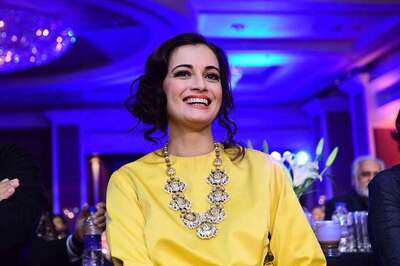
views
Now, Macaca was originally used by Belgian colonizers of the Congo to describe the native. The word is derived from the macaque monkeys and was obviously a racial slur. Actually, for lovers of comics, Captain Haddock uses that term in Tintin in the Congo.
Allen apologized to Sidarth, gave interviews to the Indian-American media, but he couldn't recover.
Sidarth is symbolic of the strong political participation among second generation Indian-Americans who are present at the grassroots at virtually every campaign.
In fact, during these elections, the leading Indian-American candidates at the federal or state level were second genners like Bobby Jindal, Raj Bhakta, AJ Sekhon and Satveer Chaudhary.
They have been proactive and given a political face to a community that is still tiny is demographic terms.
And they act quite unlike their seniors, first generation Indian-Americans - doctors, lawyers, real estate agents, hoteliers, convenience store owners, other professionals - who have made their millions and donate generously to the Democrats and Republicans in exchange for photo-ops and the ability to name-drop. Very few have leveraged the cash into real influence. Even within the Bush Administration, the changemakers have been the young Indian-American staffers who populate Washington DC.
Unfortunately, the older brigade would also rather spent ten of thousands of dollars on a political notable who gives them a smile and a pat on the back rather than supporting candidates from within their community who have a chance at the elections. Raj Bhakta is one example of how that works. This Pennsylvania Republican who contested for the House of Representatives had an opportunity to double the number of Indian-Americans in the Congress to two. He received support from some Indian-Americans like Vikram Chatwal, another second genner and a hardcore Democrat whose family is close to the Clintons. But when Bhakta, who is half-Gujarati, went to a convention of Indian motel owners to raise funds, he was ignored.
But, expect to see a lot more of these young political hopefuls. Many of them are working closely with Democratic presidential hopefuls such a Hillary Clinton and Barack Obama.
Then there's Ro, a lawyer who grew up in Pennsylvania. In 2004, a novice, Ro Khanna took on veteran Democratic Congressman Tom Lantos in California during the party's primary. He lost but made an impact. He is now the chairman of the Democratic National Committee's Indian American Leadership Council. He could be a Congressman in 2008 or 2010 either when Lantos retires or if a district is gerrymandered to his advantage. Gerrymandering is a peculiarly American act of redrawing the contours of a district to the political benefit of a particular party. Of course, you need to be in power to get that done. And that promise of gerrymandering apparently came from a certain Democrat called Nancy Pelosi. Pelosi will be the next Speaker of the US House of Representatives. first published:November 09, 2006, 10:08 ISTlast updated:November 09, 2006, 10:08 IST
window._taboola = window._taboola || [];_taboola.push({mode: 'thumbnails-mid-article',container: 'taboola-mid-article-thumbnails',placement: 'Mid Article Thumbnails',target_type: 'mix'});
let eventFire = false;
window.addEventListener('scroll', () => {
if (window.taboolaInt && !eventFire) {
setTimeout(() => {
ga('send', 'event', 'Mid Article Thumbnails', 'PV');
ga('set', 'dimension22', "Taboola Yes");
}, 4000);
eventFire = true;
}
});
window._taboola = window._taboola || [];_taboola.push({mode: 'thumbnails-a', container: 'taboola-below-article-thumbnails', placement: 'Below Article Thumbnails', target_type: 'mix' });Latest News
S R Sidarth deserves a medal from the Democratic Party. S R Sidarth who? Sidarth is the young volunteer who trailed Republican Senator from Virginia George Allen for the campaign of his challenger, Democrat Jim Webb. Sidarth, who was born in Fairfax, Virginia, videotaped Allen's campaign. He was doing that in August when Allen still enjoyed a substantial lead over Webb, when the Republican singled Sidarth out and called him a 'macaca'. You can watch that video at http://www.youtube.com/watch?v=r90z0PMnKwI.
Now, Macaca was originally used by Belgian colonizers of the Congo to describe the native. The word is derived from the macaque monkeys and was obviously a racial slur. Actually, for lovers of comics, Captain Haddock uses that term in Tintin in the Congo.
Allen apologized to Sidarth, gave interviews to the Indian-American media, but he couldn't recover.
Sidarth is symbolic of the strong political participation among second generation Indian-Americans who are present at the grassroots at virtually every campaign.
In fact, during these elections, the leading Indian-American candidates at the federal or state level were second genners like Bobby Jindal, Raj Bhakta, AJ Sekhon and Satveer Chaudhary.
They have been proactive and given a political face to a community that is still tiny is demographic terms.
And they act quite unlike their seniors, first generation Indian-Americans - doctors, lawyers, real estate agents, hoteliers, convenience store owners, other professionals - who have made their millions and donate generously to the Democrats and Republicans in exchange for photo-ops and the ability to name-drop. Very few have leveraged the cash into real influence. Even within the Bush Administration, the changemakers have been the young Indian-American staffers who populate Washington DC.
Unfortunately, the older brigade would also rather spent ten of thousands of dollars on a political notable who gives them a smile and a pat on the back rather than supporting candidates from within their community who have a chance at the elections. Raj Bhakta is one example of how that works. This Pennsylvania Republican who contested for the House of Representatives had an opportunity to double the number of Indian-Americans in the Congress to two. He received support from some Indian-Americans like Vikram Chatwal, another second genner and a hardcore Democrat whose family is close to the Clintons. But when Bhakta, who is half-Gujarati, went to a convention of Indian motel owners to raise funds, he was ignored.
But, expect to see a lot more of these young political hopefuls. Many of them are working closely with Democratic presidential hopefuls such a Hillary Clinton and Barack Obama.
Then there's Ro, a lawyer who grew up in Pennsylvania. In 2004, a novice, Ro Khanna took on veteran Democratic Congressman Tom Lantos in California during the party's primary. He lost but made an impact. He is now the chairman of the Democratic National Committee's Indian American Leadership Council. He could be a Congressman in 2008 or 2010 either when Lantos retires or if a district is gerrymandered to his advantage. Gerrymandering is a peculiarly American act of redrawing the contours of a district to the political benefit of a particular party. Of course, you need to be in power to get that done. And that promise of gerrymandering apparently came from a certain Democrat called Nancy Pelosi. Pelosi will be the next Speaker of the US House of Representatives.




















Comments
0 comment